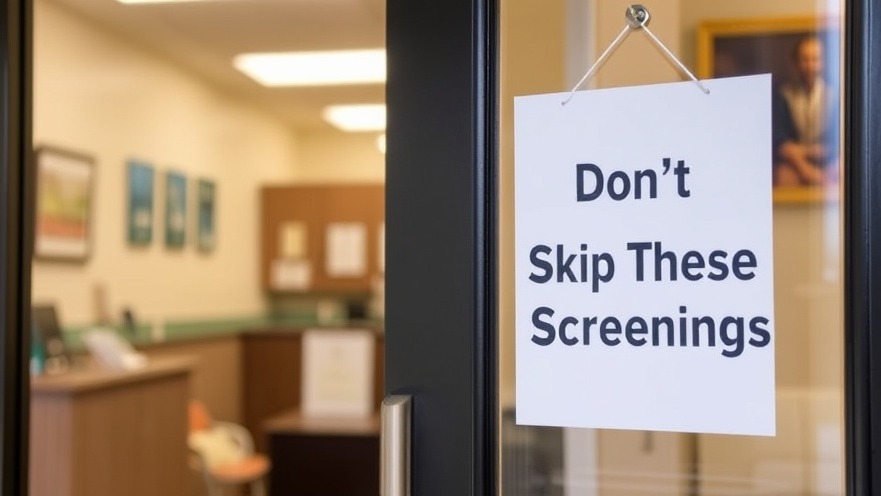
Understanding the Key Cancer Screenings You Shouldn't Overlook.
In today's health landscape, staying proactive about cancer screening can significantly impact early detection and treatment outcomes. The recent podcast episode, 3 Essential Cancer Screenings You Can’t Ignore, places emphasis on three pivotal cancers: prostate, lung, and cervical cancer. These cancers represent some of the most common threats, yet many men and women hesitate to discuss or undergo the essential screenings that can lead to early diagnosis. Let's explore these essential screenings and discuss why awareness and action are critical for everyone.
In 3 Essential Cancer Screenings You Can’t Ignore, the discussion dives into the various types of cancer and the importance of early detection through screening tests.
Prostate Cancer: Start the Conversation Early
The prostate is a small but crucial gland located just below the bladder in biological men. Its primary function is to produce seminal fluid, but it can also be a site for cancer development. Major screening methods for prostate cancer include the PSA (Prostate-Specific Antigen) test and a digital rectal exam, both of which can lead to further evaluations if abnormalities are detected.
While the thought of a rectal exam may make many uncomfortable, it takes only about five seconds and can potentially save your life. An alarming statistic is that African-American men tend to have a higher risk of developing prostate cancer, underscoring the need for open discussions around family medical history and personal health check-ups.
Lung Cancer Screening: More Than Just Smoking
Lung cancer often strikes patients who have a significant smoking history, but it's increasingly affecting non-smokers as well. Screening via a low-dose CT scan is recommended for those over age 50 with a history of smoking. It's essential to keep in mind that early symptoms, like unexplained weight loss or persistent cough, should never be ignored.
For individuals who smoke or have smoked in the past, the journey to quitting can be daunting but essential. Support through medication and behavioral changes can lead to successful cessation. Understanding the time and effort required can be a motivator; many people need to try multiple times before achieving lasting results.
Cervical Cancer: The Importance of Regular Check-ups
For biological females, understanding cervical cancer through regular screening via Pap smears is key. The guidelines now suggest that screenings should begin at age 21, allowing for earlier detection of any precancerous changes.
Additionally, the introduction of the HPV vaccine, Gardasil 9, has been a revolutionary preventive measure against cervical cancer. Designed to be effective against nine strains of HPV, this vaccine not only helps protect against cervical cancer but also several other cancers associated with HPV.
Community Conversations: Bridging the Information Gap
It’s essential for families to openly discuss personal health histories to understand the risks better. Often, issues like prostate health are overlooked, reflecting a broader societal tendency to shy away from discussing male health concerns. Regular community health reminders and familial discussions can significantly change that narrative.
Future Trends in Cancer Awareness
As we delve deeper into cancer prevention, the emphasis continues to be placed on research and the development of new screening techniques. For cancers lacking effective screening methods, like pancreatic and ovarian cancer, the need is dire for advancements that facilitate earlier detection and treatment options.
The ultimate takeaway from these discussions is clear: proactively managing your health means engaging in regular conversations with your healthcare provider, understanding your family’s health history, and advocating for the essential screenings at the appropriate ages. The risk of cancer is widespread, but through education and awareness, we can empower ourselves and our loved ones.
Thank you for exploring these vital screenings with us. Remember, awareness is the first step toward prevention. Make an appointment with your healthcare provider today—don’t wait until it’s too late!
 Add Row
Add Row  Add
Add 




Write A Comment